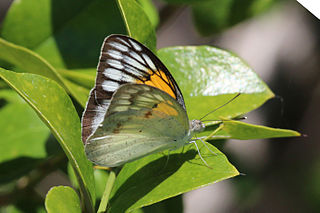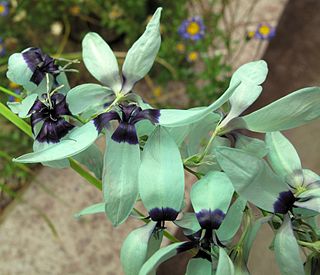See also
- Ixias , a genus of butterfly
| This disambiguation page lists articles associated with the title Ixia. If an internal link led you here, you may wish to change the link to point directly to the intended article. |
Ixia may refer to:
| This disambiguation page lists articles associated with the title Ixia. If an internal link led you here, you may wish to change the link to point directly to the intended article. |

Iridaceae is a family of plants in order Asparagales, taking its name from the irises, meaning rainbow, referring to its many colours. There are 66 accepted genera with a total of c. 2244 species worldwide. It includes a number of other well known cultivated plants, such as freesias, gladioli and crocuses.

Ixobrychus is a genus of bitterns, a group of wading bird in the heron family Ardeidae. Ixobrychus is from Ancient Greek ixias, a reed-like plant and brukhomai, to bellow.

The genus Ixia consists of a number of cormous plants native to South Africa from the subfamily Ixioideae of the family Iridaceae. Some of them are known as the corn lily. Some distinctive traits include sword-like leaves and long wiry stems with star-shaped flowers. It usually prefers well-drained soil. The popular corn lily has specific, not very intense fragrance. It is often visited by many insects such as bees. The Ixia are also used sometimes as ornamental plants.

Ixiolirion is a genus of flowering plants native to central and southwest Asia, first described as a genus in 1821. Recent classifications place the group in the monogeneric family Ixioliriaceae in the order Asparagales of the monocots. In earlier systems of classification, it was usually placed in the family Amaryllidaceae.

Ixias marianne, the white orange tip, is a small butterfly of the family Pieridae, found in India and Sri Lanka.

Ixias is a genus of pierid butterflies ranging from the Arabian Peninsula to the Philippines, mostly in the Indomalaya ecozone.

Tritonia is a genus of flowering plants in the iris family first described as a genus in 1802. They are naturally distributed across southern Africa, with a high concentration of species in Cape Province of western South Africa. The genus is closely related to the genus Ixia.

Ixia viridiflora, also known as Turquoise Ixia, is a tall member of the genus Ixia. It comes from around the Tulbagh in South Africa, Cape Province. It has small corms under the ground.

Crocoideae is one of the major subfamilies in the family Iridaceae.
Cyanixia is a genus of plants in the Iridaceae, first described in 2003. It contains only one known species, Cyanixia socotrana, a perennial, herbaceous and bulbous plant species endemic to the Island of Socotra in the Indian Ocean, part of the Republic of Yemen.

Ixia maculata is a species of flowering plant in the iris family known by the common name spotted African corn lily. It is native to the Cape Provinces of South Africa, but it is grown widely as an ornamental plant. It can also be found growing wild as an introduced species in several areas, including Western Australia. This perennial flower grows 20 to 70 centimeters tall with an erect, unbranched stem. There are a few twisting basal leaves up to 35 centimeters long. The inflorescence is a dense, showy spike of up to 12 flowers, usually orange to yellow in color, sometimes with areas of purple or red and often with spots; the coloration in garden plants varies due to breeding.

Iris domestica, commonly known as leopard lily, blackberry lily, and leopard flower, is an ornamental plant in the family Iridaceae. In 2005, based on molecular DNA sequence evidence, Belamcanda chinensis, the sole species in the genus Belamcanda, was transferred to the genus Iris and renamed Iris domestica. Other synonyms are Epidendrum domesticum L., Vanilla domestica (L.) Druce, Belamcanda punctata Moench, Gemmingia chinensis (L.) Kuntze, Ixia chinensis L., Morea chinensis, and Pardanthus chinensis Ker Gawl.)

Miriam Phoebe de Vos was a leading South African botanist and academic. She was an expert on bulbous plants, especially Romulea. She was also had a special interest in Moraea and Clivia.

VeriWave is a company in Beaverton, Oregon, U.S. It was founded in 2002 to design and manufacture specialized testing equipment for Wi-Fi and Ethernet—products primarily of interest to manufacturers of wireless access points and network infrastructure.

Ixia was a public company operating in around 25 countries until acquisition by Keysight Technologies Inc. in 2017. Ixia was headquartered in Calabasas, California and had approximately 1750 employees.
The 2011 Varsity Cup was contested from 7 February to 11 April 2011. The tournament was the fourth season of the Varsity Cup, an annual inter-university rugby union competition featuring eight South African universities.
Thestias or variant, may refer to:

Ixia polystachya, the white-and-yellow-flower cornlily, is an Ixia species found on hills and slopes of northwest and southwest Cape, South Africa.

Ixia monadelpha is an Ixia species found in wet sandy flats in the southwestern Cape of South Africa.
Keysight Technologies, or Keysight, is an American company that manufactures electronics test and measurement equipment and software. In 2014, Keysight was spun off from Agilent Technologies, taking with it the product lines focused on electronics and radio, leaving Agilent with the chemical and bio-analytical products.